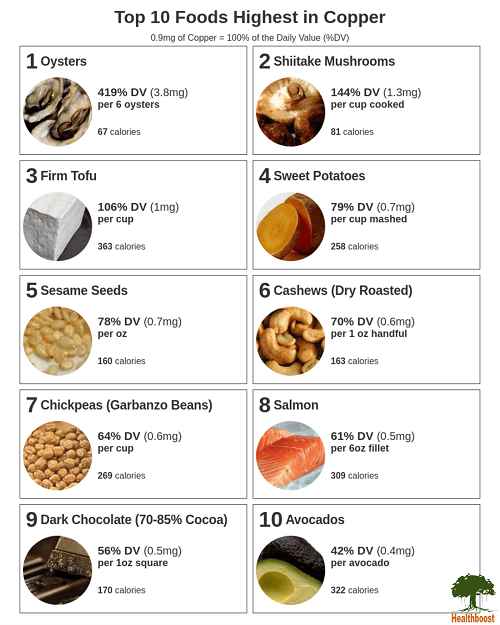Copper:
 You may think of copper as something related to electronics and wiring, but it’s also a significant trace mineral that you take into your body when you eat certain types of seafood, nuts, fruits, vegetables, and such other foods. It is found in all body tissues and your body needs copper for growth and your overall health. It plays an important role in many of your body’s systems and organs, especially in building red blood cells and protecting the nerve cells and the immune system. Together with iron, copper enables the body to form red blood cells. It also helps the body form collagen (the most abundant protein in the human body) and absorb iron, and plays a part in energy production. Most copper in the body is found in the brain, heart, kidneys, liver, and the skeletal muscle. Copper is also connected to the processing of cholesterols, the proper functioning of your immune system and the growth and development of babies in the womb. Though it’s only required in little amounts, it’s still an essential mineral – meaning that you must gain it from your diet because your body cannot produce it on its own.
You may think of copper as something related to electronics and wiring, but it’s also a significant trace mineral that you take into your body when you eat certain types of seafood, nuts, fruits, vegetables, and such other foods. It is found in all body tissues and your body needs copper for growth and your overall health. It plays an important role in many of your body’s systems and organs, especially in building red blood cells and protecting the nerve cells and the immune system. Together with iron, copper enables the body to form red blood cells. It also helps the body form collagen (the most abundant protein in the human body) and absorb iron, and plays a part in energy production. Most copper in the body is found in the brain, heart, kidneys, liver, and the skeletal muscle. Copper is also connected to the processing of cholesterols, the proper functioning of your immune system and the growth and development of babies in the womb. Though it’s only required in little amounts, it’s still an essential mineral – meaning that you must gain it from your diet because your body cannot produce it on its own.
Benefits of Copper
Improvement of Cardiovascular Health
Low copper levels have been linked to high cholesterol and high blood pressure. One group of researchers has suggested that some patients with heart failure may benefit from copper supplements.
Improves Immune Function
Too slight copper can lead to Neutropenia. This is a deficiency of white blood cells, or neutrophils, which fight off infections. A person with a lower level of neutrophils is more likely to get an infectious disorder. That’s why proper level of copper in the human body is needed to maintain the immune function. Recent records suggest that copper obtains an important part in the maintenance of immune system. Copper deficiency results in reduced cell-mediated and humoral, as well as nonspecific immune function. Damage of immune function maybe largely correlated with an increased outbreak of infection.
May Prevent Osteoporosis
Severe copper deficiency is linked with lower bone mineral density and a higher risk of osteoporosis (a condition in which bones become fragile and weak). A 2015 research found that post-menopausal women with less bone density and had very low levels of copper in their blood. The study recommended copper supplements as an effective treatment to help enhance bone density.

Helps in Collagen Production
Copper plays a significant part in maintaining elastin and collagen, major structural elements of our bodies. Scientists have believed that copper may have antioxidant features, and that, together with other antioxidants, a healthful intake may help prevent skin aging. Without enough copper, the body is unable to replace damaged connective tissue or the collagen that makes up the structure for bone. This can lead to various problems, including joint dysfunction, as bodily tissues begin to break down.
Helps Preventing Arthritis
Some studies have indicated that copper may help delay or prevent arthritis, and people wear copper bracelets for this purpose only.
Antioxidant Action
Copper may also have antioxidant properties. It may help decrease the production of free radicals which can harm cells and DNA, leading to cancer and other diseases.
Final Thoughts
A copper deficiency can have negative outcomes on health, but it is uncommon in healthy people who follow a balanced diet. Nutrient requirements should first be met through foods, and then supplements can be taken as a backup. Anyone who is considering taking a copper supplement should first consult with a health care provider.
